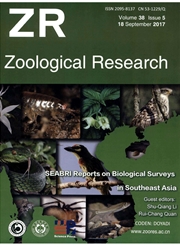

 中文摘要:
中文摘要:
Within the postpartum period, both mothers and infants are susceptible; but because PPD typically occurs for short durations and has moderate symptoms, there exists challenges in exploring and addressing the underlying cause of the depression. This fact highlights the need for relevant animal models. In the present study, postpartum adult female cynomolgus monkeys(Macaca fascicularis) living in breeding groups were observed for typical depressive behavior. The huddle posture behavior was utilized as an indicator of behavioral depression postpartum(BDP) as it has been established as the core depressive-like behavior in primates. Monkeys were divided into two groups: A BDP group(n=6), which were found to spend more time huddling over the first two weeks postpartum than other individuals that formed a non-depression control group(n=4). The two groups were then further analyzed for locomotive activity, stressful events, hair cortisol levels and for maternal interactive behaviors. No differences were found between the BDP and control groups in locomotive activity, in the frequencies of stressful events experienced and in hair cortisol levels. These findings suggested that the postpartum depression witnessed in the monkeys was not related to external factors other than puerperium period. Interestingly, the BDP monkeys displayed an abnormal maternal relationship consisting of increased infant grooming. Taken together, these findings suggest that the adult female cynomolgus monkeys provide a natural model of behavioral postpartum depression that holds a number of advantages over commonly used rodent systems in PPD modeling. The cynomolgus monkeys have a highly-organized social hierarchy and reproductive characteristics without seasonal restriction—similar to humans—as well as much greater homology to humans than rodents. As such, this model may provide a greater translational efficiency and research platform for systematically investigating the etiology, treatment, prevention of PPD.
 英文摘要:
英文摘要:
Postpartum depression (PPD) is a modified form of major depressive disorders (MDD) that can exert profound negative effects on both mothers and infants than MDD. Within the postpartum period, both mothers and infants are susceptible; but because PPD typically occurs for short durations and has moderate symptoms, there exists challenges in exploring and addressing the underlying cause of the depression. This fact highlights the need for relevant animal models. In the present study, postpartum adult female cynomolgus monkeys (Macaca fascicularis) living in breeding groups were observed for typical depressive behavior. The huddle posture behavior was utilized as an indicator of behavioral depression postpartum (BDP) as it has been established as the core depressive-like behavior in primates. Monkeys were divided into two groups: A t3DP group (n=6), which were found to spend more time huddling over the first two weeks postpartum than other individuals that formed a non-depression control group (n=4). The two groups were then further analyzed for locomotive activity, stressful events, hair cortisol levels and for maternal interactive behaviors. No differences were found between the BDP and control groups in locomotive activity, in the frequencies of stressful events experienced and in hair cortisol levels. These findings suggested that the postpartum depression witnessed in the monkeys was not related to external factors other than puerperium period. Interestingly, the BDP monkeys displayed an abnormal maternal relationship consisting of increased infant grooming. Taken together, these findings suggest that the adult female cynomolgus monkeys provide a natural model of behavioral postpartum depression that holds a number of advantages over commonly used rodent systems in PPD modeling. The cynomolgus monkeys have a highly-organized social hierarchy and reproductive characteristics without seasonal restriction--similar to humans--as well as much greater homology to humans than rodents. As such,
 同期刊论文项目
同期刊论文项目
 同项目期刊论文
同项目期刊论文
 Unenhanced dynamic MR angiography: high Spatial and temporal resolution by using TrueFISP based spin
Unenhanced dynamic MR angiography: high Spatial and temporal resolution by using TrueFISP based spin Activity levels in the left hemisphere caudate-fusiform circuit predict how well a second language w
Activity levels in the left hemisphere caudate-fusiform circuit predict how well a second language w Auditory contex tracks both auditory and visual stimulus dynamics using low-frequency neuronal phase
Auditory contex tracks both auditory and visual stimulus dynamics using low-frequency neuronal phase A new method for piercing the tentorium cerebelli for implanting fragile electrodes into the brain s
A new method for piercing the tentorium cerebelli for implanting fragile electrodes into the brain s A new MRI approach for accurately implanting microelectrodes into deep brain structures of the rhesu
A new MRI approach for accurately implanting microelectrodes into deep brain structures of the rhesu 期刊信息
期刊信息
